Can I Get Legally Married in My Garden? Exploring Your Options
Imagine exchanging vows surrounded by the beauty of nature, right in your own backyard. The idea of a garden wedding adds a personal and intimate touch to your big day. Yes, you can legally get married in your garden, as long as you meet the legal requirements and obtain the necessary marriage license.
It’s important to check in with your local authorities to ensure your space can accommodate your guests and your plans.
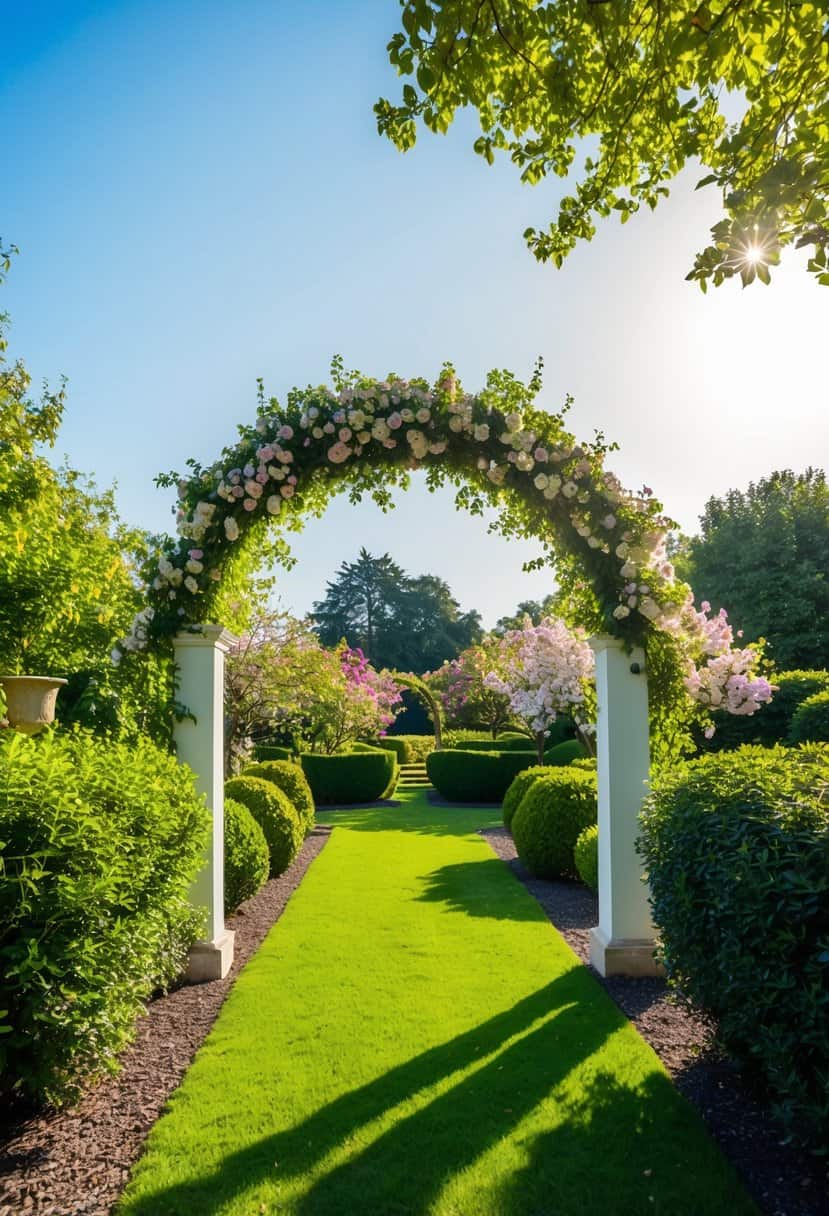
Hosting a home wedding can be both charming and convenient. You get to design the space exactly the way you want and enjoy the comfort of a familiar setting. Having an outdoor wedding at home can also be more flexible and budget-friendly, allowing you to focus on what’s most important to you.
To keep things smooth, remember to talk with your neighbors to avoid any surprises on the big day.
Many places around the world have updated laws to make such weddings easier to organize. In places like England and Wales, for example, civil ceremonies can now happen outside as of 2021. This keeps the tradition alive while embracing modern changes. With proper planning and creativity, your garden wedding can be a beautiful celebration of love that reflects your personal style.
Legal Considerations for Garden Weddings

Getting married in your own garden can be a beautiful and personal experience. Before the big day, it’s important to understand the legal steps involved, including applying for the right licenses and understanding the rules for outdoor civil weddings in your area.
Applying for Licenses
If you want your garden to be the spot where you tie the knot, you’ll need a marriage license. This is a legal requirement in most places, including the U.S. and the UK.
You will need to apply at your local registrar’s office and may have to pay a fee. In some cases, it’s also necessary to get permits for things like setting up a tent or having amplified music. Make sure to apply well in advance to avoid any last-minute hiccups.
In England and Wales, you will need to check if your garden can be registered as an approved premises for civil ceremonies. Keep in mind any local laws about noise ordinances.
You might want to talk to your neighbors if noise will be a big part of your day. Also, consider getting liability insurance if you plan to have a large gathering. This can cover accidents and protect you financially.
Understanding Outdoor Civil Weddings Laws
The rules for outdoor civil weddings can vary widely. In some places, specific requirements must be met for a ceremony to be legally recognized. For instance, certain states or regions might restrict the type of ceremony or require specific credentials for the officiant.
It’s essential to research what is allowed in your particular area.
If you’re in England and Wales, outdoor civil weddings generally need to occur at approved premises. It helps to know whether your garden can qualify.
Consider details like the availability of facilities and access for guests. If you’re planning to serve alcohol, you’ll also need to ensure compliance with local rules on alcohol service. Failure to follow these rules could impact the legality of your wedding.
Planning Your Garden Wedding
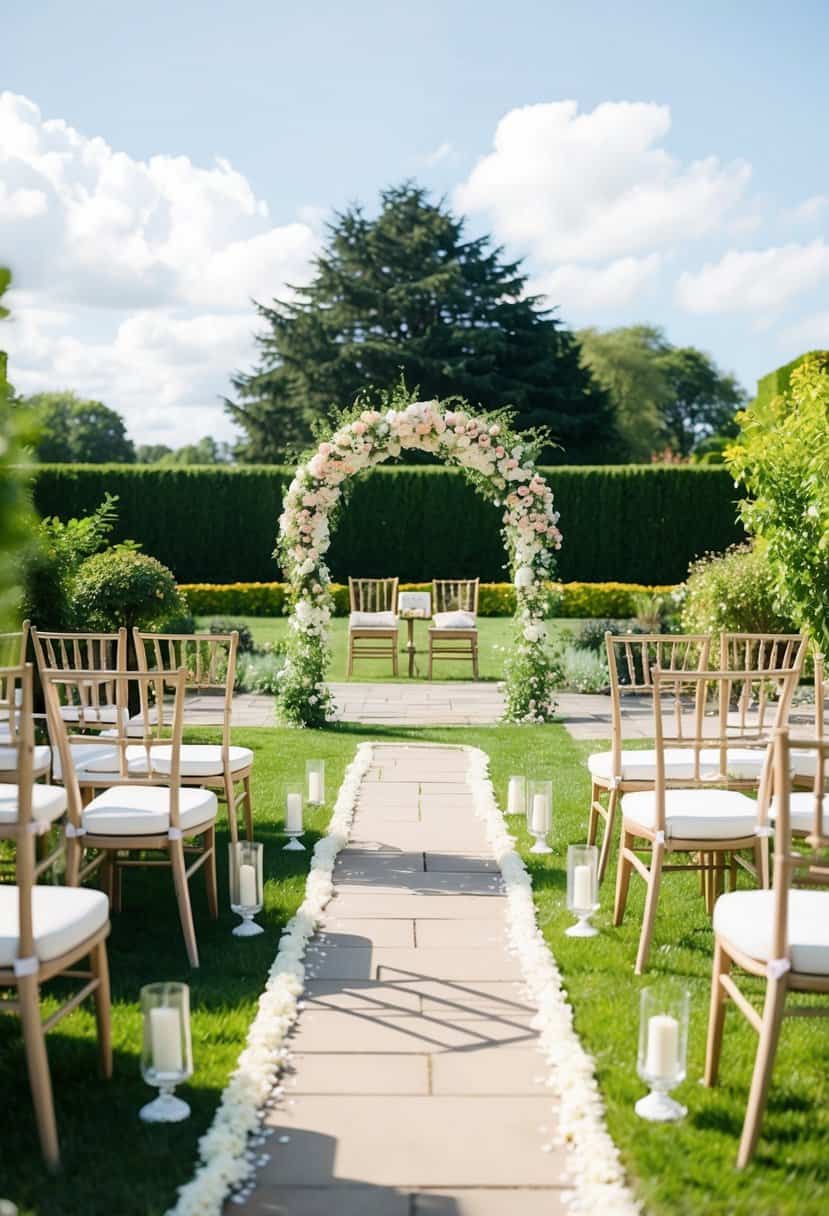
Planning a garden wedding involves several important steps to ensure everything runs smoothly. You’ll need to assess your space, select a suitable date, and create a comfortable setting for your guests.
Each of these steps requires attention to detail, from considering weather conditions to organizing necessary amenities like seating and lighting.
Assessing Your Space
First, take a good look at your garden. Make sure it can accommodate everyone comfortably. Think about where the ceremony and reception will take place. You might need to rearrange certain areas or add features like a dance floor or portable restrooms for your guests’ convenience.
It’s important to check for any uneven surfaces or potential hazards. An uneven garden can cause problems for guests, especially those wearing heels.
Also, consider accessibility for disabled guests, and make sure paths are clear and easy to navigate.
Selecting a Wedding Date
Choosing the perfect date for your garden wedding is crucial. Consider the climate and typical weather patterns. You might want a spring or early summer wedding when flowers are blooming and temperatures are pleasant.
The day of the week can also impact your wedding. Weekends might be more convenient for guests, but consider alternate days if cost or availability is an issue.
It’s important to book early to secure your desired date, especially during peak wedding season.
Creating a Comfortable Environment
Making your guests comfortable should be a priority. Provide enough seating and shaded areas. You might want to set up tents or canopies to protect from unexpected rain or strong sun.
Lighting is essential for evening events; consider string lights or solar lamps to add ambiance.
Sound systems might be needed to ensure everyone can hear the ceremony and music. Test the equipment before the big day to avoid technical glitches.
Hiring a professional to help manage sound can be a great choice, ensuring everything runs smoothly from ceremony to reception.
Selecting the Right Officiant
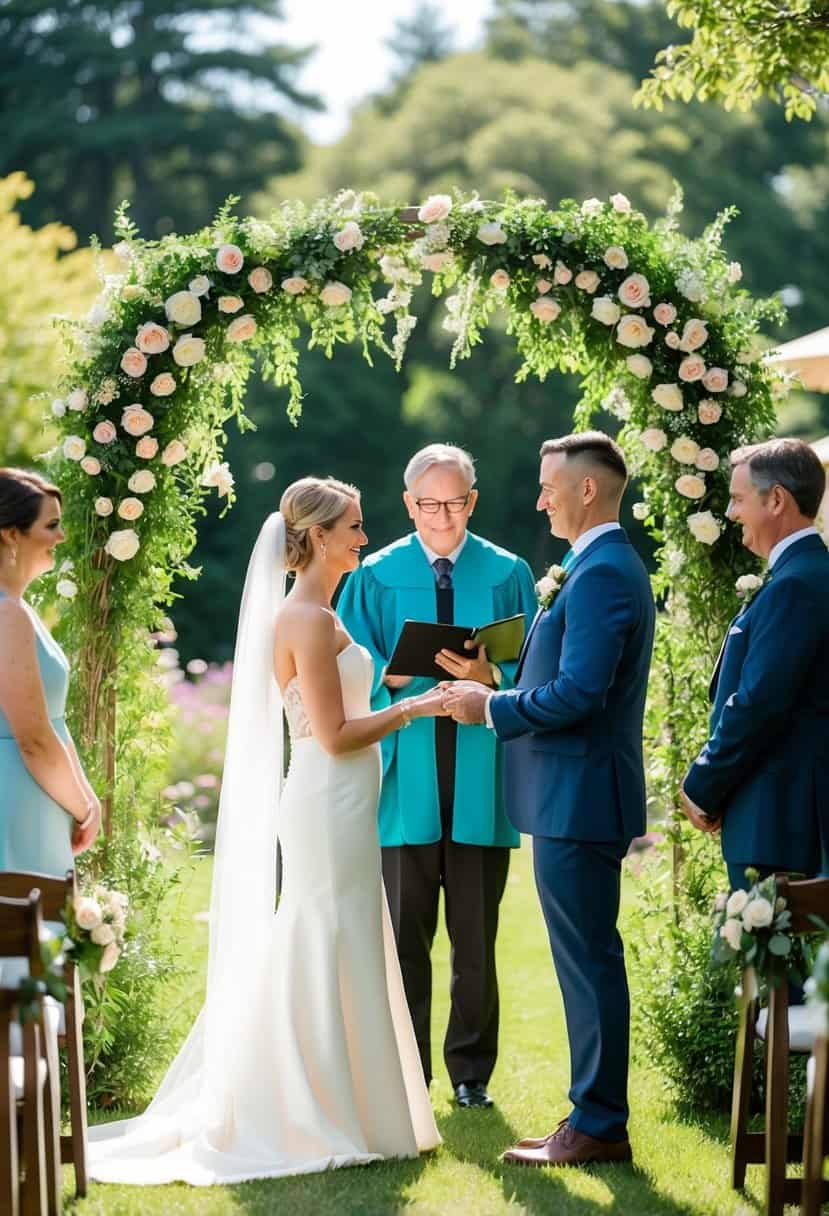
Choosing the right officiant is key to creating a memorable ceremony. You want someone who matches the vibe of your outdoor ceremony and complements your style.
Whether your wedding is formal or casual, finding someone with the right approach is important.
Start by deciding if you want a traditional or non-traditional ceremony. Some officiants specialize in personalizing ceremonies to include unique wedding vows or even adding humor.
Consider having a friend or family member officiate. This can add a personal touch, but make sure they meet all legal requirements in your area. They may need to become ordained or have special permissions.
If you prefer a professional, look for someone experienced with outdoor ceremonies. They should be comfortable using a microphone if needed and adaptable to any weather changes. This ensures everything goes smoothly on the big day.
When you interview potential officiants, ask if they can incorporate your personal elements and if they’re willing to work in your chosen location, like your garden.
Keep budget in mind, too. Costs can vary based on the ceremony’s location, date, and level of personalization. According to experts, the average fee is around $250 but can vary widely. Always discuss fees upfront.
Budgeting for Your Backyard Wedding
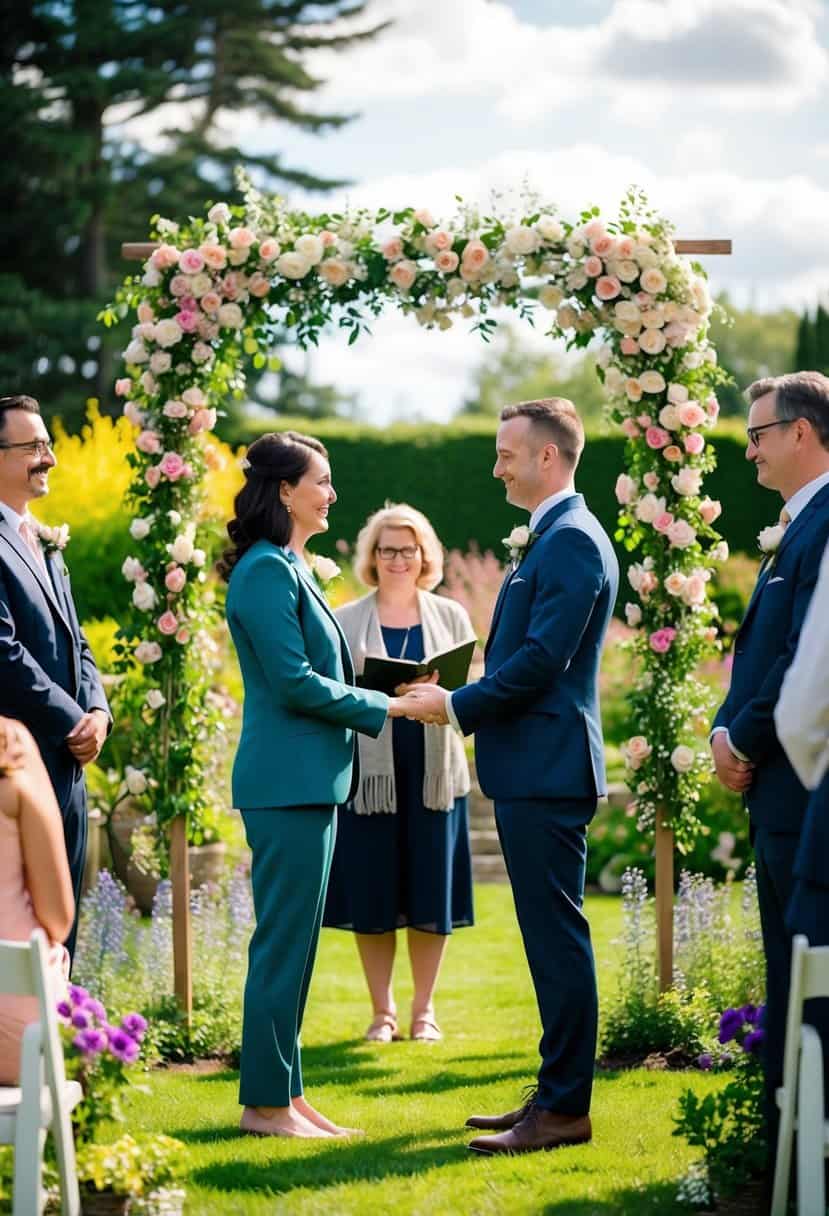
Planning a wedding can be exciting, especially when it’s in your own backyard! Let’s dive into how to budget for your special day.
Venue Costs: Your own backyard can save you a lot on the venue fees. Instead of renting a hall, use your garden. This gives you more freedom but remember to budget for extra amenities like tents or portable restrooms if needed.
Guest List: The number of guests affects everything from food costs to chairs and tables. Consider a smaller guest list to keep it cozy and cost-effective.
Food and Drink: Catering can be a big part of the budget. Think about a DIY buffet or hire a food truck for a unique vibe. You can also save by buying drinks in bulk.
Decor: Get creative! Use items you already have at home, or borrow decorations from friends and family. Consider DIY projects for centerpieces and bouquets which can be both fun and budget-friendly.
| Item | Estimated Cost |
|---|---|
| Food and Drink | $1,000 – $3,000 |
| Rentals (Tables/Chairs) | $500 – $1,500 |
| Decorations | $200 – $800 |
| Miscellaneous | $300 – $700 |
Backup plans can help with unexpected expenses. For weather concerns, a rental tent is a wise investment. Make sure to check local permits or regulations for backyard weddings here.
Start planning early and keep track of your spending to enjoy a beautiful and stress-free wedding day!
Designing a Garden Wedding Experience
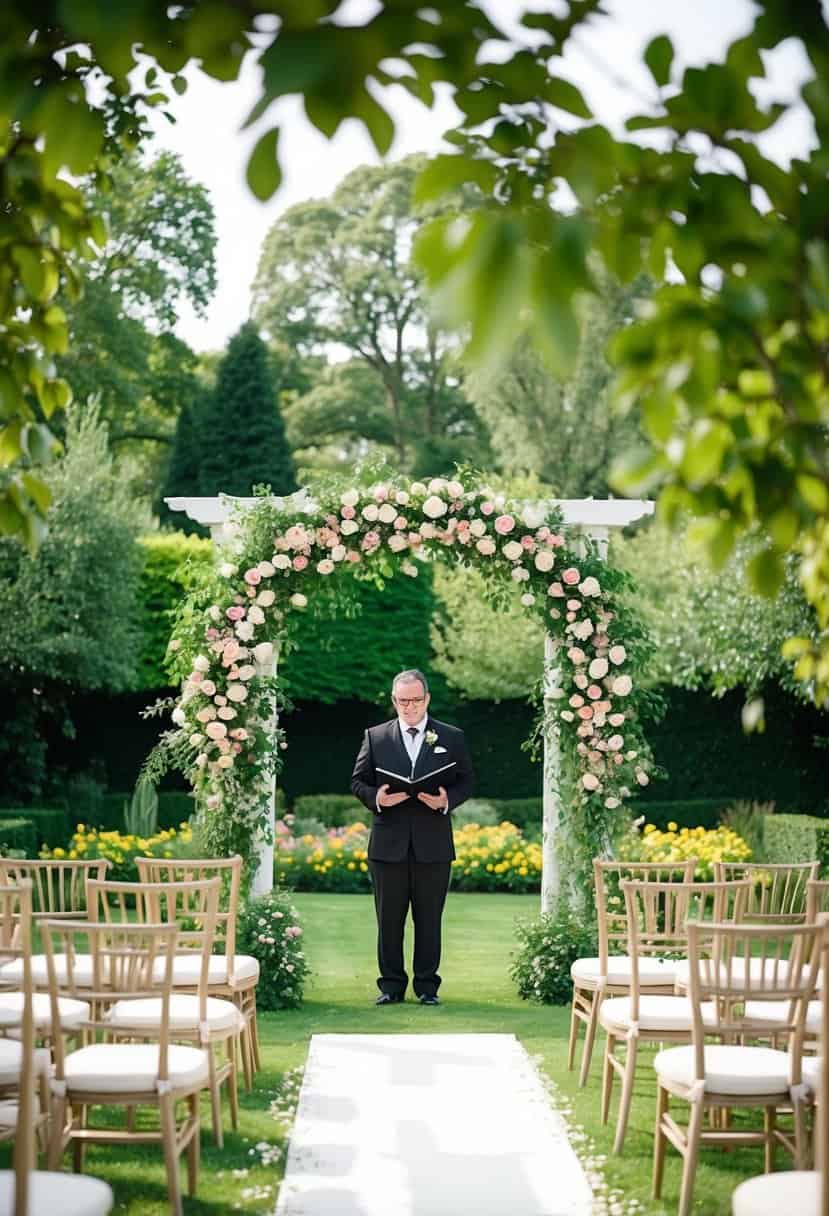
Creating a beautiful garden wedding involves choosing elegant decor and managing audio challenges. You need to transform your backyard into a charming venue while making sure your music and celebrations comply with local rules.
Decor and Aesthetics
Decor is essential in turning a simple garden into a stunning wedding venue. Start by choosing a theme that complements your garden. Use living walls or trellises covered in vines and flowers to add depth and beauty. String lights or lanterns can set a romantic mood when the sun sets.
Consider the seating arrangements to ensure everyone feels comfortable. Rustic benches or elegant chairs can match the theme perfectly. Personal touches, such as homemade signs or a DIY photo booth, can make the setting even more special. Think about the pathways too; a charming walkway of stepping stones or flower petals can make the experience memorable for your guests.
Noise and Music Management
Managing noise is important for any outdoor wedding. First, check for local noise restrictions to ensure your celebration follows the rules. Some neighborhoods might have limits on music volume or how late into the night it can play.
Selecting the right sound system can be crucial. Portable speakers and wireless mics can help music and vows be heard clearly by everyone. You might want to think about the placement of music equipment in relation to your neighbors to minimize disruptions.
Planning ahead will ensure that your garden wedding runs smoothly without any interruptions.



